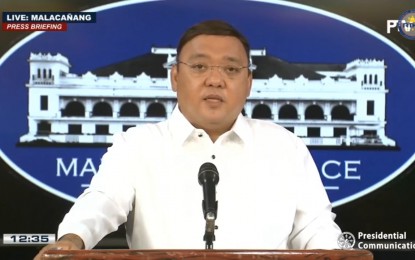
Presidential Spokesperson Harry Roque (File photo)
MANILA – Amid mounting concerns over supposed human rights violations under the Duterte administration, Malacañang on Wednesday said they will not allow United Nations (UN) special rapporteurs to investigate on deaths linked to the crackdown on illegal drugs.
“Under the UN system, the state’s consent is required and believe me ‘no, there’s no need to allow into the country so-called experts with very fixed biases against the Philippines already,” Presidential Spokesperson Harry Roque said in an interview over CNN Philippines’ The Source.
Roque said prohibiting the rapporteurs from conducting a probe is a sovereign prerogative recognized by the UN system.
“There’s nothing that the UN can do if we do not allow rapporteurs into our country,” he added.
Roque also assured that domestic processes are in place to ensure that the drug war is within the rule of law, adding that there are enough remedies for victims of human rights violations.
“In case anyone feels that they have been aggrieved, they can resort to these procedures ‘no. Aside from the courts, we have an abundance of administrative remedies where the perpetrators are state agents such as the police. You can go to (People's Law Enforcement Board), you can go to the National Police Commission, you can go to the Ombudsman for the military and the police ‘no, you can go to the Civil Service Commission,” he said.
He said the “true test” of whether a state complies with its obligations under human rights law is if the government able to give the victims adequate domestic remedies.
“Of course, there may be violations—isolated violations of human rights but what is important is under human rights law, we have to give victims adequate domestic remedy which we have in the form of the Department of Justice National Prosecution Service, the local courts and Commission on Human Rights; and we have even recently created an inter-agency committee to look into alleged cases of illegal killings,” he said.
Roque pointed out that there is no legal principle under international law that prohibits states from acting on the scourge of illegal drugs and terrorism.
“It is a valid sovereign act; it is in fact an act which forms part of the international program of the international community even in the UN system. We have UN Anti-Drugs Office based in Vienna, Austria which shows that it is in fact an obligation of the state to protect its people from the scourge of illegal drugs and the President therefore will continue with even more passion in the last two years this war on drugs criticisms notwithstanding,” he said.
In a speech before the UN General Assembly, President Rodrigo Duterte expressed readiness to engage in dialogue and constructive engagement with the United Nations on matters concerning human rights.
Duterte, however, said this dialogue should be done “in full respect of the principles of objectivity, non-interference, non-selectivity, and genuine dialogue.”
In June 2019, UN special rapporteurs issued a joint statement asking the UN to conduct an independent investigation into alleged human rights violations in the Philippines.
Duterte, in March the same year, ordered the withdrawal of the Philippines from its membership in the International Criminal Court (ICC) based in The Hague. (PNA)
